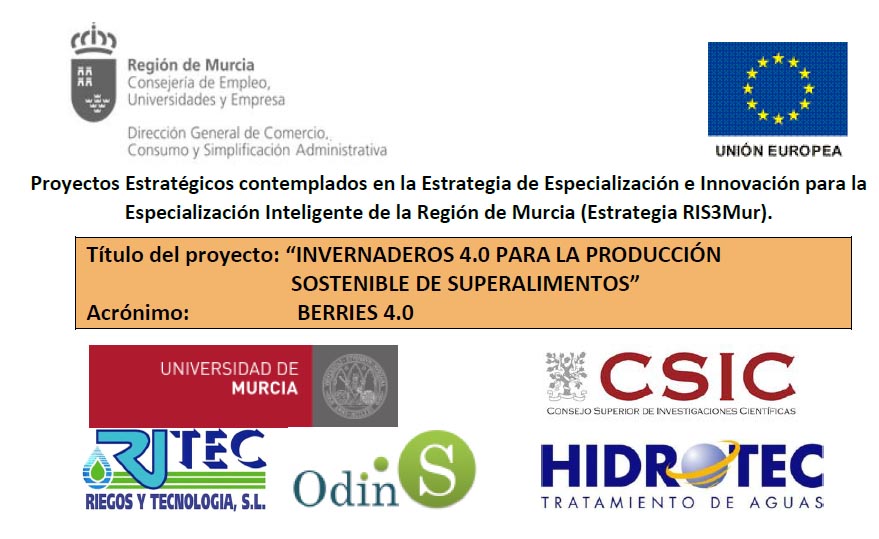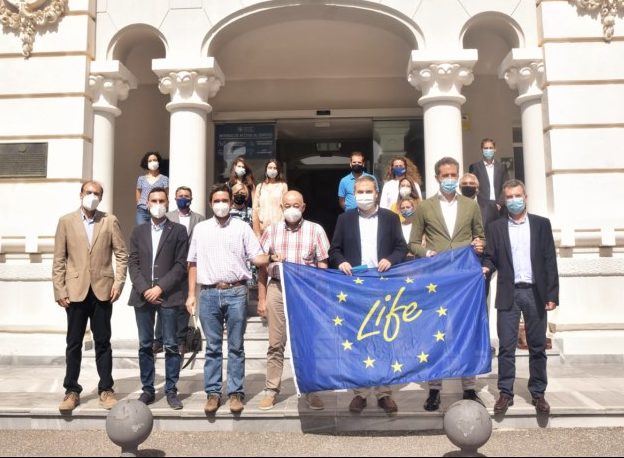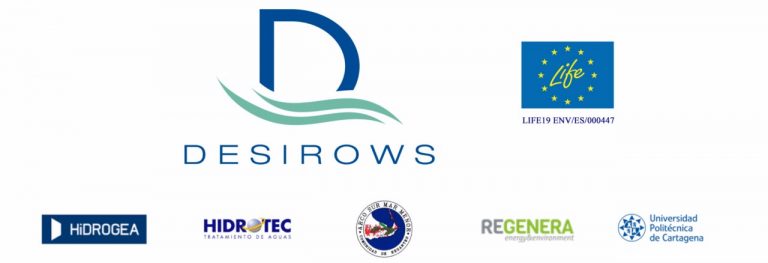
In recent years the sustainability of the horticultural sector in the region has been questioned due to the environmental impact that this activity could have. This view has been aggravated by the eutrophication of aquifers, in part due to the increase in nitrates and phosphates from agricultural leachates. This, together with other structural problems of the horticulture sector, is having a negative impact on one of the pillars of the Murcian economy, being therefore necessary to provide measures and solutions to revitalize the regional agricultural sector.
This project is based in the parallel development of four fundamental aspects in production systems in protected crops, providing innovative solutions and alternatives for the future that will help to strengthen Murcia’s agricultural sector:
- Development of an integral system (hardware) for the handling and management of irrigation, nutrition and climate in greenhouses with crops without soil in a closed system.
- Development of a multilayer control architecture for greenhouse crop management based on the latest Internet of Things (IoT) technologies, Cyber-Physical Systems (CPSs) and cloud software platform (Cloud Computing). This will allow us to delocalize the intelligence of the system and the personalization of production, principles inherited from the philosophy of Industry 4.0.
- Development of an information analysis system (Bigdata), modeling of the system and decision making support to optimize the profitability of agricultural operations, mainly in greenhouses.
- Establishments of optimal agronomic conditions for sustainable production of so-called “superfoods“, where red fruits or forest fruits are located.
To carry out this project, three leading companies in the region have been associated (Hidrotec Tratamiento de Aguas, Riegos y Tecnología – Ritec and Odin Solutions), together with two institutions with great experience in the development of R&D projects (UMU and CEBAS-CSIC)
The company Riegos y Tecnología SL will develop a comprehensive system for irrigation, nutrition and climate management in greenhouses. This will include the management of closed systems.
A very important part of the system is composed of an osmosis unit. This will be developed by Hidrotec Tratamiento de Aguas, and will be characterized by working with a high efficiency (up to 85%) and will develop a system to reduce the impact of the brine nowadays valuing this waste and avoiding environmental pollution.
The company Odin Solutions will develop the multilayer control architecture through Cyber-Physical Systems (CPS), which perform critical tasks and will act as an interface with the integral system. The CPSs will link to the next level of control (edge computing) that will have the different control modules of the greenhouse (virtualized).
A third layer of control is responsible for data analysis and Bigdata, where the University of Murcia (UMU) will develop the different modules of the cloud platform in charge of knowledge extraction, modeling and optimization of the system. The UMU will use the latest technologies included in what has been called “Industry 4.0” (Internet of Things (IoT), cloud computing, “Big Data” and analytics, systems integration, etc.) in order to use the information obtained to model and help the decision in the integral control of crops grown in the greenhouse.
Lastly, the department of Plant Nutrition of the CEBAS-CSIC, brings a long experience in crops without soil and greenhouse and will contribute to establish the optimal conditions for the cultivation of red fruits with high contents of nutraceutical products and high productivity.
Therefore, this project will not only contribute to the revitalization of the agricultural sector of the Region of Murcia, taking advantage of its optimal climatic characteristics, and contributing to the development of sustainable agriculture, but will also put other Murcian companies at the forefront of technological innovation, being able to apply these technologies to other systems of agricultural production and other crops of great interest for the economic development of the Region.

 The European Union has co-financed a project that removes existing nitrates from the groundwater that drains into the lagoon, contributing to reduce the nutrients that reach the Mar Menor. From an industrial perspective, the removal of nitrates and the recycling and reuse of all groundwater are addressed. This project will reduce the arrival of nitrates to the saltwater lagoon.
The European Union has co-financed a project that removes existing nitrates from the groundwater that drains into the lagoon, contributing to reduce the nutrients that reach the Mar Menor. From an industrial perspective, the removal of nitrates and the recycling and reuse of all groundwater are addressed. This project will reduce the arrival of nitrates to the saltwater lagoon.


